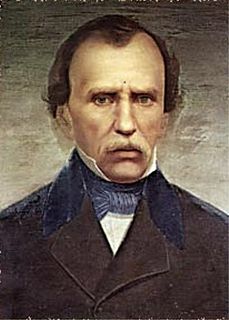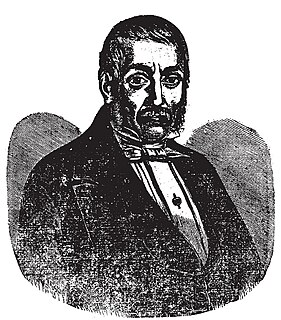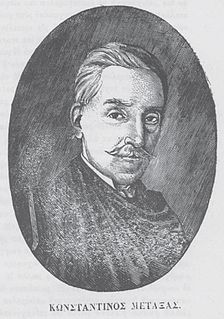
Andreas Metaxas was a Greek politician, fighter of the Greek War of Independence and diplomat from Cephalonia. He was prime minister of Greece from September 3, 1843 to February 16, 1844. The military leaders of the revolution gave him the ironic nickname of Conte Lalas due to his injury during the Battle of Lalas.

The First National Assembly of Epidaurus was the first meeting of the Greek National Assembly, a national representative political gathering of the Greek revolutionaries.

Michael Soutzos, was a member of the Soutzos family of Phanariotes, he was the grandson of Michael Drakos Soutzos; he was in turn a Prince of Moldavia, between 12 June 1819 and 29 March 1821. He was initiated into Filiki Eteria, he supported the Greek revolution in Moldavia and Wallachia and after the creation of the Greek state, he served as ambassador of the country abroad.
Manthos Economou was a Greek member of the Filiki Eteria, private secretary and advisor of Ali Pasha of Ioannina. He was executed by the Ottoman troops.

Georgios Gennadios was a Greek man of letters who was instrumental in the founding of some of the first educational establishments of modern Greece, considered among the most important personalities of the Greek Enlightenment (Diafotismos), often referred to as the "Teacher of the Nation".
Athanasios Sekeris was a Greek merchant and a prominent member of Filiki Eteria. He was the brother of Panagiotis and Georgios Sekeris.
Apostolis Kolokotronis was a chieftain of the Greek War of Independence and an officer of the Greek army from Arcadia. He was member of the well-known Kolokotronis family.
Pieros Voidis Mavromichalis was a military leader of the Greek Revolution of 1821. He was born in Mani and he was killed in action on 20 May 1825, during the battle of Maniaki between Greek revolutionaries and the Egyptian forces of Ibrahim Pasha.
Christos Palaskas was a Greek chieftain during the Greek War of Independence. He was killed on 25 May 1822 by Odysseas Androutsos’s men, during an internal conflict.

Konstantinos Metaxas was a Greek fighter of the Greek War of Independence and politician from Cephalonia.

Konstantinos Asopios was a Greek scholar and academic teacher of the 19th century from Epirus.
Christoforos Zachariadis was fighter in the Greek Revolution of 1821,and was originally from Kyparissia. He participated in military operations in Moldavia and Wallachia initially and then later in Peloponnese. He worked with the "Committee of Zakynthos". Politically, he was considered to be a follower of the anglophile political party.
Melchisedek Tsouderos was a Greek monk and fighter of the Greek War of Independence from Crete. He was killed in 1823 in a battle with the Ottoman forces.

Stefanos Chalis was a Greek chieftain and a fighter of the Greek War of Independence from Crete. He was the younger brother of fighters of the Revolution, Vassilios and Ioannis, who were also notable chieftains.
Dimitrios Papatsonis was a fighter of the Greek War of Independence from Peloponnese. He was killed at the age of 27 in June 1825 during the battle of Trikorfa against the Egyptian forces of Ibrahim Pasha of Egypt.
Mitros Petrovas or Mitropetrovas was a military leader of the Greek War of Independence from Messenia and one of the leaders of the anti-government riots during the Bavarian regency of Greece.
Michalis Kourmoulis was a Greek leader of the Greek War of Independence from Crete and one of the major military leaders on the island during the war.
Konstantinos Vlachopoulos was an armatolos, army leader of the Greek War of Independence and the first Greek leader of the Hellenic Royal Gendarmerie. He was also a member of the Filiki Eteria, a secret organization whose purpose was to overthrow the Ottoman rule of Greece and establish an independent Greek state.
The Battle of the Trench was fought near Tripolitsa in Arcadia in August 1821 during the first year of the Greek War of Independence between the Greek revolutionary forces led by Theodoros Kolokotronis and the Ottoman garrison of Tripolitsa. The battle ended with the complete victory of the Greeks.
Ioannis Trikoupis was a Greek politician of the Greek War of Independence.













